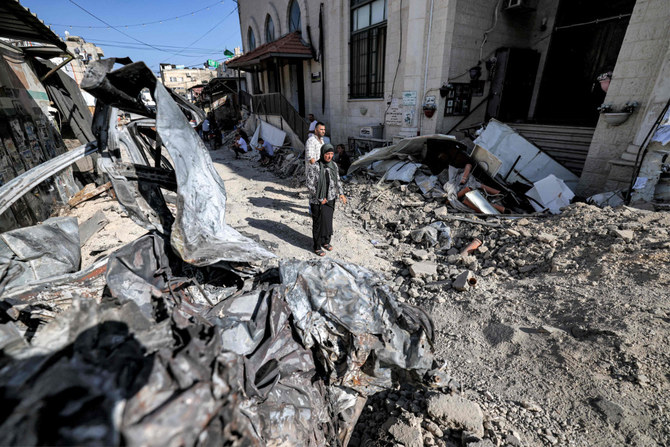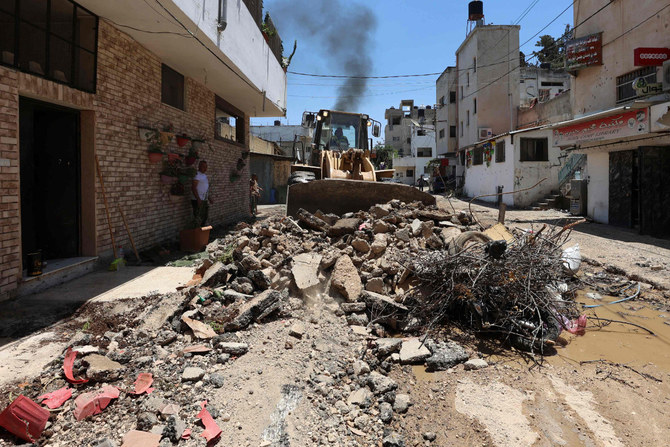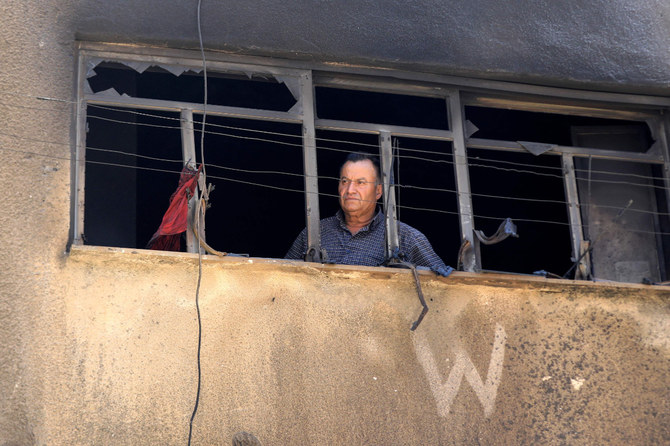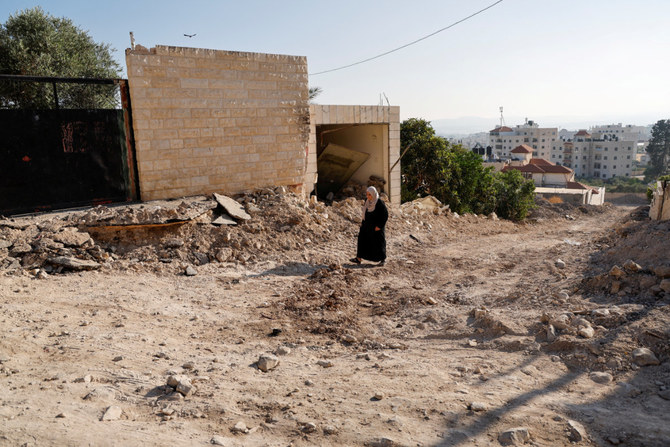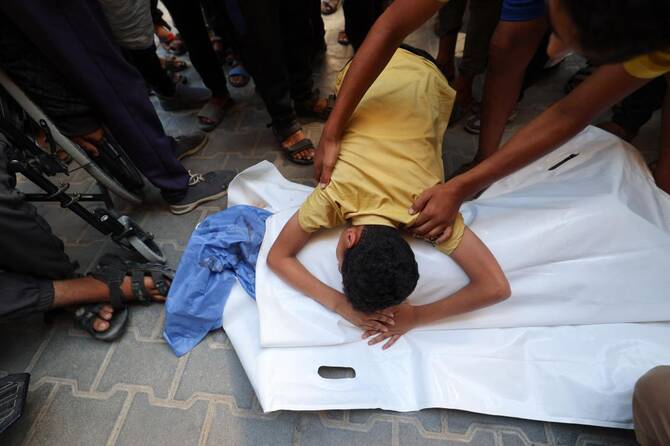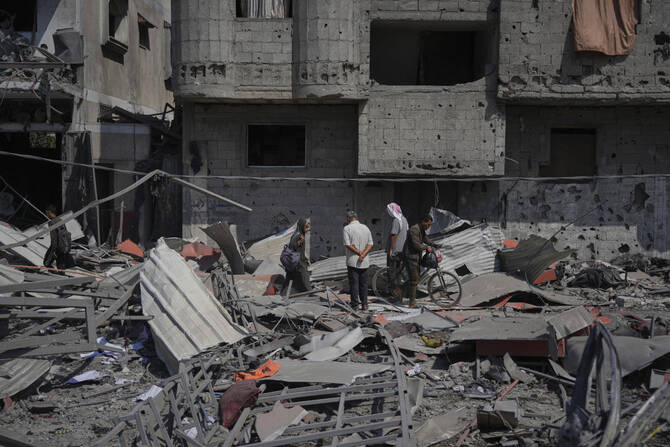RAMALLAH: Palestinians on Thursday began counting the cost of the damage inflicted by the Israeli offensive on the Jenin refugee camp and its infrastructure.
The most intense Israeli military operation in the occupied West Bank in nearly two decades left a trail of wrecked streets and burned-out cars, and sparked fury across the Arab world.
Palestinian residents encountered scenes of widespread destruction as they emerged from their homes and returned from nearby shelters.
The Israeli offensive destroyed the infrastructure in Jenin camp, killing 12 civilians and wounding 100.
Public Works and Housing Minister Mohammed Ziyara said that a timetable would be set for the reconstruction process.
Infrastructure such as roads needed a short period to repair, up to a maximum of three months, he said.
Buildings required a longer period and might need about nine months, the minister said.
The extent of the damage in the city of Jenin and its camp included four buildings that had been destroyed entirely, and the cost of reconstruction was $1.5 million, Ziyara said.
The number of buildings damaged in a medium or large-scale way but not in a state of collapse amounted to 25, and the cost of reconstruction was $2 million.
The number of partially damaged residential units reached 250 units and the cost of reconstruction was $2.5 million.
The number of damaged commercial and service buildings reached 150 and the cost of reconstruction was $5 million, he said.
Ziyara confirmed that specialized committees assessed the damage and submited reports to the prime minister to provide an overall picture.
The work had been divided into several phases, he said.
Local Government Minister Majdi Al-Saleh said that the size of the initial damage in the Jenin camp was estimated at millions of shekels.
Shami Al-Shami, a prominent leader of the Fatah movement in Jenin, said that UAE President Sheikh Mohammed bin Zayed Al-Nahyan had instructed authorities in his country to meet all the needs of the Jenin camp.
He said the UAE pledged to give $15 million to help rebuild the Jenin refugee camp.
The money will be granted to UNRWA, the UN agency that assists Palestinian refugees, to rebuild damaged homes and businesses and for the agency’s services.
The president has requested an assessment of the extent of the damage in the camp and the costs of its rehabilitation, Al-Shami added.
Prime Minister Mohammad Shtayyeh had instructed the Palestinian Authority’s ministries and institutions to provide the necessary budgets for the relief and reconstruction of Jenin camp, said Ibrahim Melhem, a spokesperson for the Palestinian government.
Reconstuction efforts were being planned despite the complex financial crisis faced by the government, Melhem told Arab News.
Rami Al-Junaidi, head of the Workers Union in Hebron Municipality, said that the extent of the destruction caused by the Israeli aggression on Jenin was huge.
“Roads were completely bulldozed and some buildings were about to fall, and rubble filled the streets and impeded movement.”
Palestinian economist Samir Hulileh said that a different type of infrastructure must be built in the Jenin camp.
“Shelters for the citizens to take refuge in from the Israeli bombardment should be included so that we do not see the scene of their forced displacement outside the camp, as in every Israeli military invasion of the camp,” he told Arab News.
Hulileh referred to the financial burden and cost of rebuilding the Jenin camp at a time when both the UNRWA and the Palestinian Authority “are blind to very difficult financial conditions.”
Nasr Abdel Karim, professor of economics at the Arab-American University, told Arab News that there was direct and indirect economic damage in the Jenin camp as the Jenin economy was negatively affected by the Israeli military operation.
Popular campaigns have been launched in the cities of the West Bank to provide relief and support to the people of Jenin and its camp.
Hanadi Al-Barghouti, coordinator of the Ramallah Campaign, highlighted the efforts to support “our people in the Jenin camp.”
He said that the campaign had received a great response.
On the first day of the attack, two trucks arrived in the Jenin camp, and all parcels were distributed to affected families.
On Wednesday, another truck loaded with necessities, including food and supplies, clothes, blankets and medicines and money, was donated.
Bakr Abd Al-Haq, coordinator of the Nablus campaign, said that it came as a response to the scenes of displacement, assaults on families, and calls for relief from the heart of the camp.
He indicated that 57 trucks, buses and vehicles delivered goods. Three of the buses were loaded with medical supplies and others with food, mineral water and children’s supplies.
“The campaign reflects the cohesion and unity on the ground between Jenin and Nablus,” said the coordinator.
“Two years ago in all the incursions and attacks, Jenin was one of the first cities to stand by Nablus. And today it is Nablus’ turn to return part of the gratitude and to deliver a message to the occupation,” he said.
“Jenin is not alone. Nablus is present with aid, standing beside it,” he said.
The US White House, meanwhile, urged its ally Israel to rebuild civilian infrastructure in Jenin.



